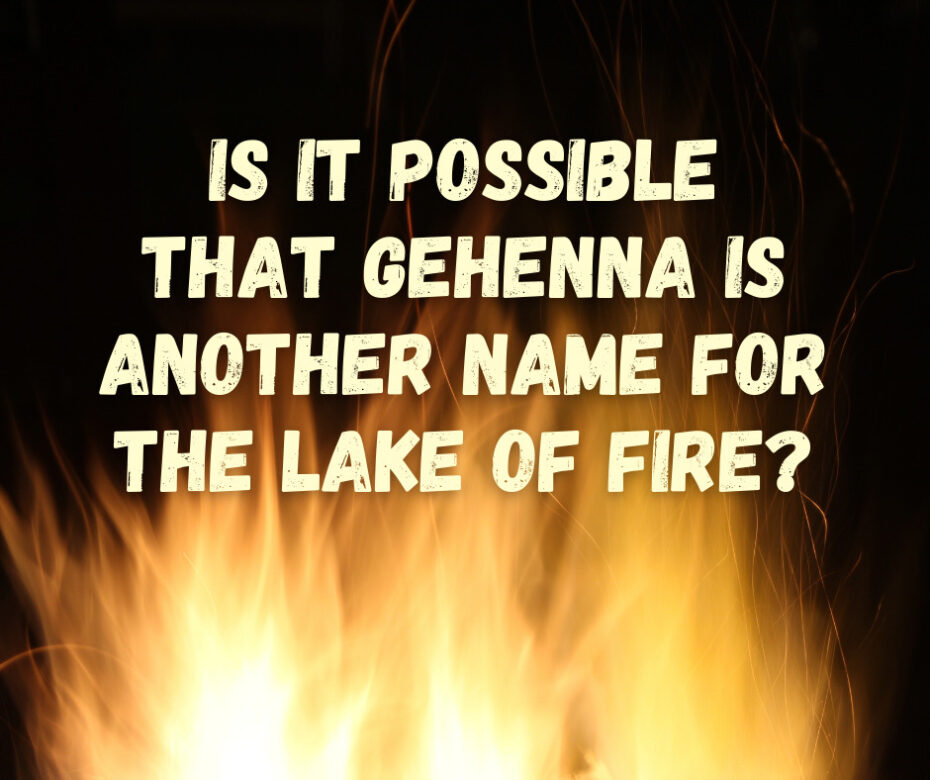My friend Bill Fiess sent me an email suggesting that my view of Gehenna was not correct. He wrote: “It has been suggested (I think by you) that hell is not the same as the lake of fire [Rev 20:15], but I think that Matt 18:8-9 [and also the parallel Mark 9:45-47] suggest otherwise.” Matthew 18:8-9 says, “If your hand or foot causes you to sin, cut it off and cast it from you. It is better for you to enter into life lame or maimed, rather than having two hands or two feet, to be cast into the everlasting fire. And if your eye causes you to sin, pluck it out and cast it from you. It is better for you to enter into life with one eye, rather than having two eyes, to be cast into hell fire.”i The expression hell fire translates the Greek tēn Geennan tou puros (lit., the Gehenna of fire].”
In my book The Ten Most Misunderstood Verses in the Bible, I wrote:
Gehenna might sometimes be a synonym for the lake of fire, and on other occasions, it might be a reference to temporal judgment. Gehenna only occurs twelve times in the New Testament. All but one, Jas 3:6, “the tongue…is set on fire by hell [Gehenna],” in the Synoptic Gospels. Most of these tell us little about what Gehenna is other than it is a place of pain (i.e., Matt 5:22, 29, 30; 10:28; Luke 12:5), of fire (Matt 18:9), of unquenchable fire (Mark 9:43, 45, 47), or of judgment/condemnation (Matt 23:33). One verse speaks of being “a son of Gehenna” (Matt 23:15).ii
Bill got me to wondering if Gehenna is always a synonym for the lake of fire.
I looked up these dozen verses again, and I saw how all could refer to the lake of fire. That is, it is possible that none of these verses refer to what the OT calls Sheol or what the NT calls Hades, the place where unbelievers go when they die.iii
Shawn told me that some have debunked the idea, which I mentioned elsewhere in my Ten Words book,iv that Gehenna might refer to temporal judgment since it referred to a garbage dump outside Jerusalem where trash was burned. I looked online and found a good article by Todd Bolen, entitled, “The Myth of the Burning Garbage Dump of Gehenna,” at BiblePlaces Blog (see here). Bolen agrees with Bill, writing, “It is not difficult to see, from these and other texts (e.g., 2 Kgs 23:10; 2 Chr 28:3, 33:6; Jer 32:35), why Jesus and his contemporaries used the word Gehenna (“valley of Hinnom”) as synonymous with the place of everlasting fiery torment.”
I want to do more study of these dozen NT texts. But at this point, I think it most likely that Gehenna does refer to the lake of fire.
On a side note, I think that Geenna should be translated as Gehenna.
The reason why some Free Grace people gravitate toward understanding Gehenna as a garbage dump where trash was burned is because it eliminates some potential problem passages. However, there are good explanations for these texts, many of which we have on our website.
What is Gehenna? It is the lake of fire, the place where unbelievers will experience torment forever.
Where is Gehenna? It likely does not exist yet. Most likely it will be created after the destruction of the current universe (2 Pet 3:10-12). So where will Gehenna be? The Bible does not say. It is someplace outside the New Earth and Jesus’ kingdom (Rev 20:15). My best guess is that it will be a planet either somewhere in the new universe, or in a different universe altogether (if there will be multiple universes).
______________________
i If this text is about the lake of fire, then it seems to teach works salvation. However, the Lord probably means that if anything hinders us from coming to faith in Him for everlasting life, then we do best to eliminate that hindrance. See two articles on a parallel text, Matt 5:29-30, here and here, for more details.
ii Page 93, in the chapter on hell.
iii Prior to Jesus’ ascension, both believers and unbelievers went to Sheol/Hades (Luke 16:19-31).
iv See p. 61, note 5.


